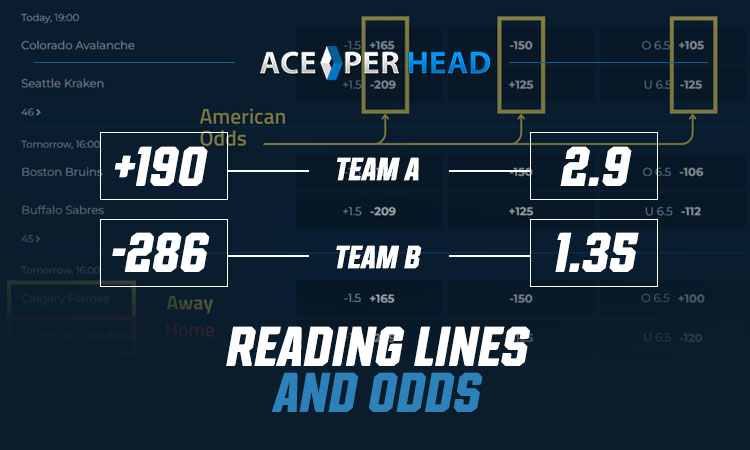
If you love sports betting, you’re not only engaging in a hobby that appeals to modern audiences. Gambling can be traced back to ancient Greece. In the 1700s, people began officially betting on horse racing through the Jockey Club.
Here, we’re going to give you five tips on how to become a bookie so you can join that rich history. Read on to learn all about reading lines and odds and how you can set fair ones for your sportsbook.
1. Understand American Odds
American odds are also called “Moneyline odds.” They’re the most important thing for new sports bettors to understand since they’re extremely common. If you’re placing sports bets in the United States, they’re likely the numbers that you’ll find on sports betting sites you frequent.
These odds denote the favorite team (the one most likely to win) with a symbol. They add a + symbol before the name of the underdog (who is less likely to win.)
For example, in a Bears vs Packers football game, you might see the odds:
- Bears -300
- Packers +500
The Bears are the favorite, and the Packers are the underdogs. However, the number beside the symbol is just as important, if not more so.
When you see a number next to your favorite team, it means that you’ll need to wager that sum to win $100. So, if you wager $300 on the Bears in the above example and win, you’ll get $400 returned to you (the initial wager and $100 in winnings).
The number next to the underdog indicates how much money you’ll win if you stake $100 on them. If you put $100 down on the Packers and win, you’ll get $600 back (the initial wager and $500 in winnings).
2. Look Into Other Types of Odds
Like American odds, both fractional and decimal odds offer a higher payout if the underdog wins. However, the underdog is less likely to win, so it’s a riskier bet.
Fractional odds are most common in the United Kingdom. Some sportsbooks call them “British odds” or “traditional odds.”
If you go to a sportsbook and see a fraction of 2/1 beside the Bears, it means that you’ll get $2 in winnings for every dollar wagered if the Bears win. So, if you bet $100 and the Bears win, you’ll get $200 in prize money back with the initial wager.
The Packers may then be listed with 5/1 odds. If you wagered $100 on them and won, you would get $500 in prize money back along with the original $100.
Decimal odds are extremely easy to work with. They’re common in Europe and Oceania.
The favorite team (the Bears for our purposes) will have the lower number beside them. The underdog (Packers) will have a higher number, like this:
- Bears: 0.8
- Packers: 2.2
Each number shows the sum you could win against each dollar you wager. So, if you bet $100 on the Bears, you’ll win $80; if you bet $100 on the Packers, you’ll win $220.
3. Check Out Sports Teams and Variations
Reading lines and odds requires practice, so give yourself room to learn. Go to other sports betting websites and check out their odds listings. See how they lay things out, and consider what competitive lines usually look like.
This will give you insight into how you can bet wisely.
You will likely want to begin betting on favorites. While underdogs do have a higher payout, placing multiple bets on favorite teams will give you a more consistent profit. Big winnings mean big stakes, and big stakes mean that you’re more likely to lose your money.
Look into the records for the sports teams that are listed. See what the consensus is and determine why. If the teams have gone up against each other in the past, consider those records too.
Also, consider whether there have been coaching changes, recent injuries, or player turnarounds since then. If the team is having an especially good or bad season, that may also impact your decision.
This is the information bookies and oddsmakers use when setting lines. If you want to run an online sportsbook, it’s more important to do this research than ever before.
4. Bookies: Work With Professional Oddsmakers
As a bookmaker, setting lines is a big part of your job. You’ll need to do your research, determine who’s most likely to win, and deem that team the favorite (and the other team the underdog.)
Then, you’ll need to explore the lines that other sportsbooks have set and see what kinds of payout they’re offering. You want to offer something comparable but competitive, and people will be more likely to bet with you when they think they’ll get more money when they win.
It can be challenging to balance that requirement with your sportsbook’s financial needs, but a pay per head bookie also has a secret weapon: professional oddsmakers.
While Ace Per Head offers 100% configurable boards, we also offer assistance from expert oddsmakers who know how to set high-quality lines. You don’t need to do all the heavy lifting on your own and can instead focus on turning a profit.
5. Adjust and Readjust Regularly
Bookies need to keep an eye on lines, just like any sharp bookie should. Injuries happen midway through the season; teams have unnatural losing streaks. Things change, and you learn more about new player talent levels and the impact of new coaches.
You’re going to need to update your lines for future games as things proceed. Make sure that you adjust everything in real time and let oddsmakers know what you want to change.
Put Your Sharp Sports Bettor Skills to Good Use
Now that you know how to be a sharp bookie and turn a profit, it’s time to use your knowledge to build a career as a bookie. Our online sportsbook services aim to help budding bookmakers take bets and cash out. You’ll be able to set lines and limits, post odds, and adjust lines from one mobile-ready dashboard.
We’re committed to helping you learn the ins and outs of reading and interpreting lines and odds. Create your package today to begin building a website and chatting about your sports betting business needs.




 Ace Per Head has been in the online bookmaking services business since 1998 running one of the top-rated and most trusted brands in the pay per head industry. We give our bookie agents the personalized dedicated service they deserve.
Ace Per Head has been in the online bookmaking services business since 1998 running one of the top-rated and most trusted brands in the pay per head industry. We give our bookie agents the personalized dedicated service they deserve.
